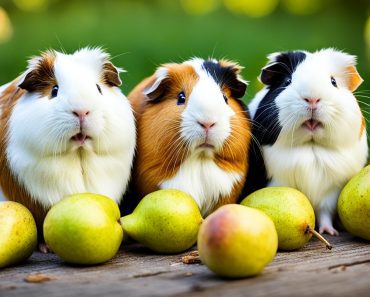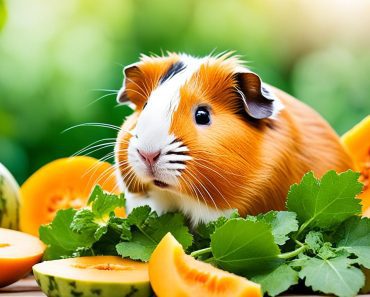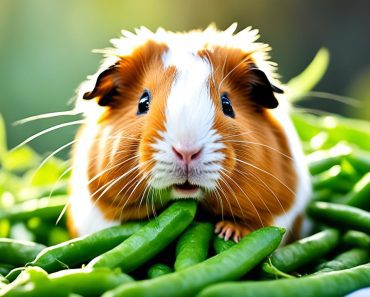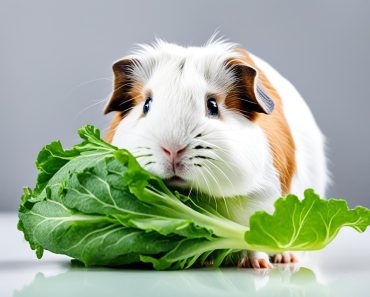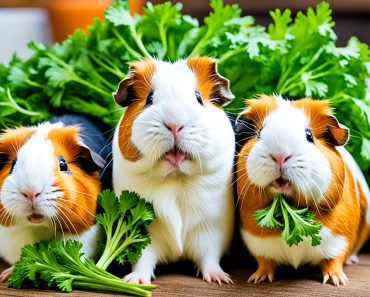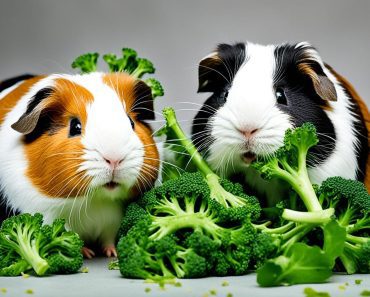As an owner of a guinea pig, you want to provide them with a well-balanced diet that includes a variety of vegetables. But what about brussels sprouts? Can guinea pigs eat brussels sprouts? Let’s explore this topic and find out!
When it comes to guinea pigs and veggies, nutrition plays a crucial role in their overall health and well-being. It’s important to understand the benefits and potential drawbacks of feeding specific vegetables to ensure you’re making the right choices for your furry friend.
Can Guinea Pigs Eat Brussel Sprouts? Yes, they can, as an occasional snack.
- Guinea pigs can eat brussels sprouts in moderation.
- Brussels sprouts are rich in vitamins A, C, and K, which are beneficial for a guinea pig’s overall health.
- However, brussels sprouts should be fed sparingly due to their calcium content and the presence of oxalates.
- Monitor your guinea pig for any signs of digestive discomfort and adjust their diet accordingly.
- Consult with a veterinarian for personalized advice regarding your guinea pig’s diet.
Nutritional Benefits of Brussels Sprouts for Guinea Pigs
When it comes to a guinea pig’s diet, brussels sprouts can be a nutritious addition. These small green vegetables are packed with essential vitamins and minerals that contribute to a guinea pig’s overall health and well-being.
Brussels sprouts are a good source of Vitamin A, Vitamin C, and Vitamin K. Let’s explore the benefits of these vitamins for guinea pigs:
- Vitamin A: This vitamin supports healthy eyesight and strengthens the immune system, helping guinea pigs stay active and vibrant.
- Vitamin C: Guinea pigs cannot produce their own Vitamin C, making it crucial for their diet. Brussels sprouts provide a natural source of this vitamin, which aids in digestion and promotes faster healing.
- Vitamin K: Essential for blood clotting and bone health, Vitamin K is particularly important for guinea pigs. Including brussels sprouts in their diet ensures adequate intake of this vitamin for optimal well-being.
In addition to vitamins, brussels sprouts also contain antioxidants and fiber, further enhancing their nutritional value for guinea pigs. Antioxidants help eliminate harmful free radicals from the body, protecting guinea pigs against oxidative stress and promoting overall health. Fiber, on the other hand, aids in digestion, preventing common digestive issues and keeping their gastrointestinal system functioning smoothly.
Feeding guinea pigs a varied diet that includes brussels sprouts can provide them with the essential nutrients they need to thrive. However, it is important to remember that moderation is key. While brussels sprouts offer numerous benefits, excessive consumption can lead to health issues due to their calcium content and the presence of oxalates. It is always wise to consult with a veterinarian to determine the appropriate portion sizes and frequency of feeding brussels sprouts to your guinea pig.
Downsides of Brussels Sprouts for Guinea Pigs
Despite their nutritional benefits, there are a few downsides to feeding brussels sprouts to guinea pigs. Brussels sprouts contain oxalates, which are high in calcium and can lead to kidney and urinary stones if consumed in excess. Therefore, they should be fed in moderation. Overfeeding brussels sprouts can also result in an excess intake of fat-soluble vitamins, which is not ideal for guinea pigs.
While brussels sprouts can provide essential nutrients to guinea pigs, it is important to be cautious about the risks associated with their consumption. The high oxalate content in brussels sprouts can contribute to the formation of kidney and urinary stones, which can cause discomfort and health issues for guinea pigs. It is crucial to feed brussels sprouts in moderation and monitor the guinea pigs’ overall health and well-being.
Additionally, brussels sprouts contain fat-soluble vitamins such as Vitamin A, Vitamin D, and Vitamin E. Although these vitamins are necessary for guinea pigs, excessive intake can lead to an imbalance and potential health problems. It is crucial to provide a diverse diet that includes a variety of vegetables to prevent an overabundance of fat-soluble vitamins from brussels sprouts alone.
“Feeding brussels sprouts to guinea pigs in moderation can be part of a healthy diet. However, it is important to be aware of the potential risks associated with their consumption, such as kidney and urinary stones and an excessive intake of fat-soluble vitamins.” – Guinea Pig Nutrition Expert
| Downsides of Brussels Sprouts for Guinea Pigs | Precautions |
|---|---|
| Oxalates | Feed in moderation to avoid kidney and urinary stones |
| Fat-Soluble Vitamins | Monitor intake to prevent vitamin imbalance |
It is essential to consider the downsides of feeding brussels sprouts to guinea pigs and take necessary precautions to ensure their well-being. Providing a balanced diet that includes a variety of safe vegetables is key to maintaining their overall health. Consulting with a veterinarian or a knowledgeable breeder can provide further guidance on the appropriate nutrition for guinea pigs.
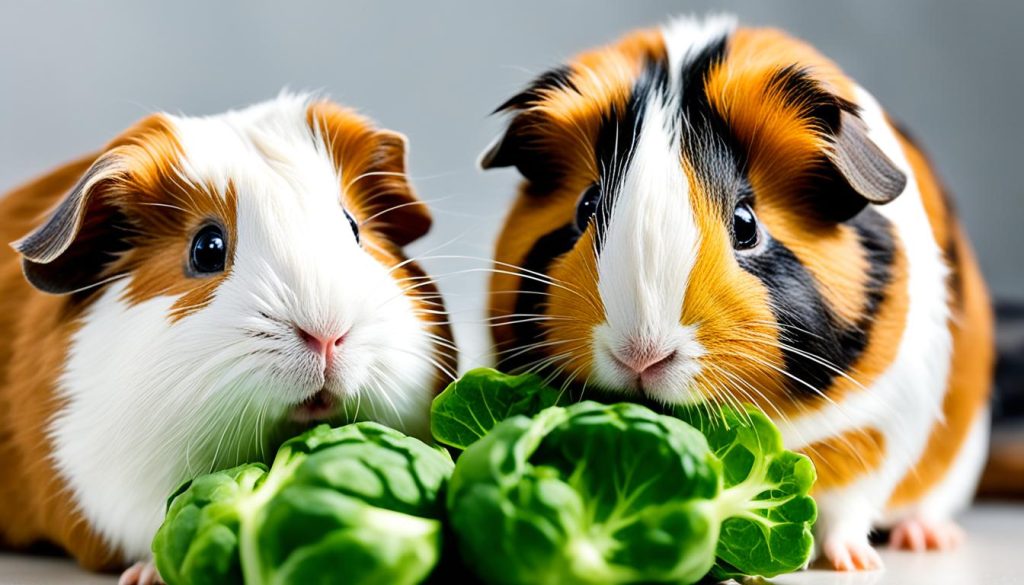
Feeding Brussels Sprouts to Guinea Pigs
When it comes to feeding Brussels sprouts to our furry friends, proper preparation and portion control are essential. To ensure the safety of guinea pigs and protect them from harmful pesticides, it is crucial to wash the Brussels sprouts thoroughly before serving them.
Guinea pigs can enjoy the taste of Brussels sprouts in moderation. A recommended serving size is three to four leaves, given once or twice a week. This controlled portion allows guinea pigs to benefit from the nutritional value of Brussels sprouts without overwhelming their sensitive digestive systems.
As responsible pet owners, it’s important to monitor our guinea pigs for any signs of digestive discomfort or bloating after introducing Brussels sprouts to their diet. If any adverse reactions occur, it is advisable to consult a veterinarian and adjust their diet accordingly.
Introducing new foods gradually is a wise approach to gauge guinea pigs’ tolerance and preferences. Each guinea pig has unique dietary needs, and it’s essential to understand their individual responses to different vegetables. By gradually incorporating Brussels sprouts into their diet, we can ensure that guinea pigs are comfortable and enjoy their meals.
| Safe Vegetables for Guinea Pigs | Feeding Frequency |
|---|---|
| Brussels Sprouts | Once or twice a week, 3-4 leaves |
| Green Cabbage | 2-3 times a week, small portions |
| Courgette (Zucchini) | 2-3 times a week, small portions |
| Mangetout (Snow Peas) | 2-3 times a week, small portions |
| Broccoli | 2-3 times a week, small portions |
| Kale | 2-3 times a week, small portions |
Remember, Brussels sprouts are just one of many vegetables that can be safely included in a guinea pig’s diet. It’s important to offer a variety of vegetables to ensure a well-rounded nutritional intake. Always ensure that the vegetables are fresh, free from pesticides, and thoroughly washed before serving them to your beloved guinea pigs.
Other Vegetables for Guinea Pigs
Aside from brussels sprouts, there are several other safe and nutritious vegetables that guinea pigs can enjoy as part of their diet. These vegetables provide a variety of essential vitamins and minerals to support their overall health and well-being. Here are some examples of vegetables that guinea pigs can safely consume:
- Green cabbage
- Courgette (zucchini)
- Mangetout (snow peas)
- Broccoli
- Kale
These vegetables offer a range of nutrients, including Vitamin C, Vitamin A, fiber, and antioxidants, that contribute to a guinea pig’s optimal nutrition. However, it is crucial to feed these vegetables in moderation to prevent any potential digestive issues. Additionally, always ensure that the vegetables are fresh and free from any pesticides or spoilage before serving them to your guinea pig.
Remember to introduce new vegetables gradually and monitor your guinea pig’s reaction to them. Every guinea pig is unique, and they may have individual preferences and sensitivities. If you notice any signs of discomfort or digestive upset, it’s best to consult with a veterinarian for personalized advice on your guinea pig’s diet.
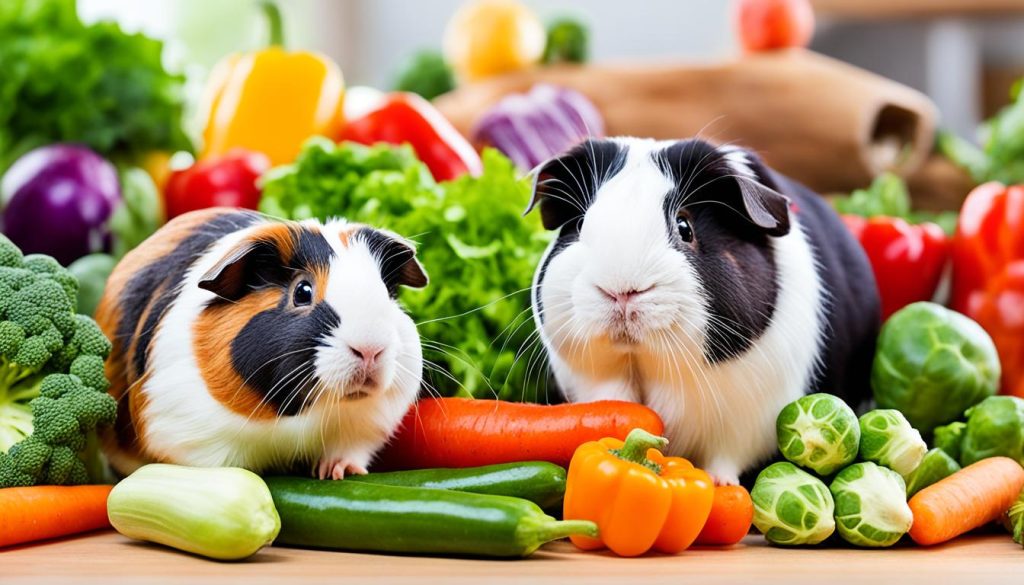
Vegetables to Avoid for Guinea Pigs
When it comes to feeding guinea pigs, it is essential to be aware of the vegetables that should be avoided. Some vegetables contain compounds that can be harmful to guinea pigs and may lead to health issues. Here are the vegetables that you should exclude from your guinea pigs’ diet:
- Onions: Onions should be avoided as they contain substances that can cause anemia and digestive problems in guinea pigs.
- Garlic: Garlic is another vegetable to avoid as it can impact the red blood cell count and digestive system of guinea pigs.
- Rhubarb: Rhubarb contains high levels of oxalic acid, which can interfere with calcium absorption and may lead to kidney and urinary problems.
- Mushrooms: While mushrooms may seem like a safe option, they are not recommended for guinea pigs as they do not provide significant nutritional value.
- Pickles: Pickles are a preserved food that typically contains high levels of salt and other ingredients that may be harmful to guinea pigs.
If you are unsure about whether a vegetable is safe for your guinea pig, it is always best to consult with a veterinarian or knowledgeable breeder. They can provide guidance and help you establish a specific dietary plan for your furry friend’s needs.
Conclusion
Guinea pigs can enjoy the occasional serving of brussels sprouts as part of a well-balanced diet. These leafy greens provide valuable vitamins and nutrients, including Vitamin A, Vitamin C, and Vitamin K, which contribute to their overall health and wellness. However, it is vital to exercise caution and feed brussels sprouts in moderation due to their calcium content and the presence of oxalates.
Feeding a variety of vegetables, such as brussels sprouts, can offer guinea pigs a diverse range of nutrients essential for their growth and development. However, it is crucial to remember that guinea pigs have specific dietary needs. Always monitor their health and well-being and adjust their diet accordingly.
Consulting with a veterinarian is highly recommended to receive personalized advice and guidance on your guinea pig’s diet. They can provide valuable insights into the appropriate portion sizes and frequency of feeding brussels sprouts to ensure the best possible nutrition for your furry friend. Remember, a happy and healthy guinea pig starts with a well-rounded diet that includes a variety of veggies!

